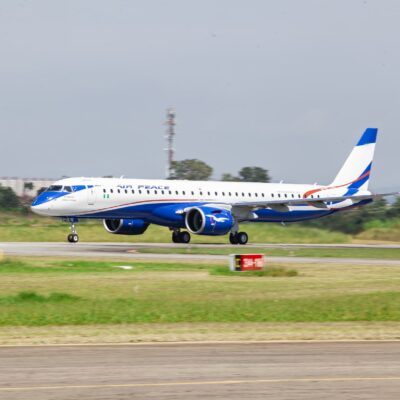
BY: OLAPEJU OLUBI
The Nigerian Civil Aviation Authority (NCAA) has thrown more light on reasons for grounding all Max Air Boeing B737, in light of contaminated fuel discovered in the tank of one of the airline’s aircraft.
All Max Air Boeing 737 were recently suspended by the aviation regulatory agency following a series of incidents involving the airline within a short spate of time.
Speaking with newsmen in a zoom meeting, the Director General of NCAA, Captain Musa Nuhu said the grounding of the airline was to ensure safety before it can be allowed to resume passengers’ operations again, explaining that when fuel enters the tank of an aircraft, it goes through the engine and may do damages to some filters.
Captain Nuhu referenced several four occurrences in recent times involving Max Air B737 aircraft, one of those which was Loss of Number 1 Main Landing Gear (MLG) wheel, considered serious in aviation. incident involving it
The incident took place between Take-off at Yola Airport Adamawa State and on landing at Nnamdi Azikiwe International Airport, Abuja Nigeria on 7th May, 2023.
The incident of Fuel Contamination of the main fuel tanks of B737- 300 aircraft with Registration Marks; 5N-MHM, leading to the Auxiliary Power Unit (APU) shutdown on ground at Yola Airport on the 7th of July, 2023, was emphasised by the regulator.
Another incident was the Aborted take-off of Boeing 737-400 aircraft, registration marks 5N-MBD, which occurred at the Mallam Aminu Kano International Airport (MAKIA) due to high Exhaust Gas Temperature (EGT) indication on the 11th of July, 2023.
Lastly, An air return by Max Air aircraft B737-300, Registration Marks; 5N-MHM to Nnamdi Azikiwe International Airport (NAIA) due to duct overheat indication in the cockpit on the 11th of July, 2023 also attributed to the suspension of the airlines aircraft type.
While giving further details about the airline’s Boeing 737 suspension, Captain Nuhu said that on the same day he received the report of the contaminated fuel, the authority carried out a check in Yola by test running the aircraft to Kano without passengers and on its arrival at Kano, the aircraft was grounded while investigation is ongoing.
The NCAA boss noted that his team met with Max Air the following day for proper discussion as the crew came to Abuja where they were interrogated.
“On the issue of contaminated fuel, Max Air, we don’t know what happened but we are doing investigations on all sides. We learnt that that particular aircraft took fuel in Lagos, took fuel in Abuja and took fuel in Kano. So, our people have gone to those fuel suppliers the one in Lagos, the one in Abuja and the one in Kano to investigate to see whether that is the source the water in the tank is: they are looking at their storage facilities, they are looking at their browsers and they are looking at their fueling procedures to ensure everything is working within standards. Aviation fuel is very sensitive and we cannot afford to have any problems,” he said.
“Max Air might be a victim of the fuel supplier maybe during their storage or fueling or whatever water got into the aircraft…We will conclude the Investigation to see the source of this contamination, if it is Max Air we take the appropriate action; if it is the fueling companies, responsible action will be taken,” he stressed.
He said the NCAA is working to ensure fuel suppliers continuously meet the requirements of the aviation industry.
Reacting to comments about laxity on the part of NCAA, Nuhu stated that “as a regulator, we cannot have a knee jerk reaction and come out and make statements without confirming what the issues are and what measures were put in place to ensure these problems are rectified. So, we are doing quite a lot.”
He said “I don’t have to come out and tell the whole world everything we do, we are supposed to speak when we have affirmative action of what is happening and based on the interview my people had with the staff including Director of Operations, License and Training and Director of Airworthiness and Standards, we started Investigation, identified the three companies that they took fuel from that same day and Investigation has started to see if that issue of fuel contamination can be traced to the supplier.”
Nuhu stated that NCAA would hold a meeting with the Nigeria Upstream Regulatory Commission, a regulatory agency on fueling activities, in order to share knowledge on safety elements in Jet A1 supply, saying the CAA is working to ensure fuel suppliers continuously meet the requirements of the industry.





